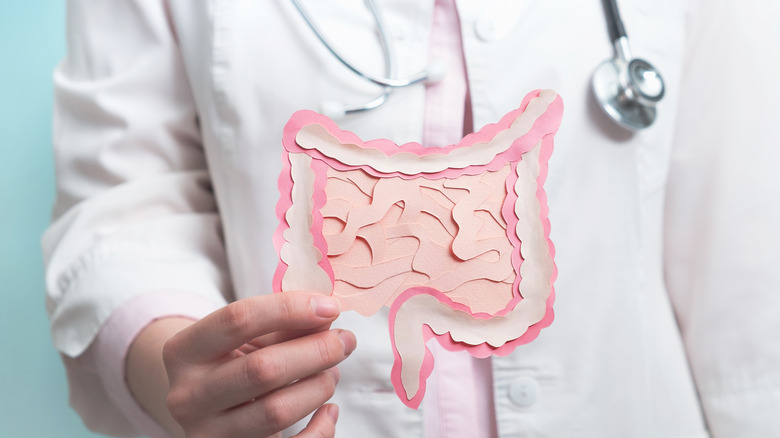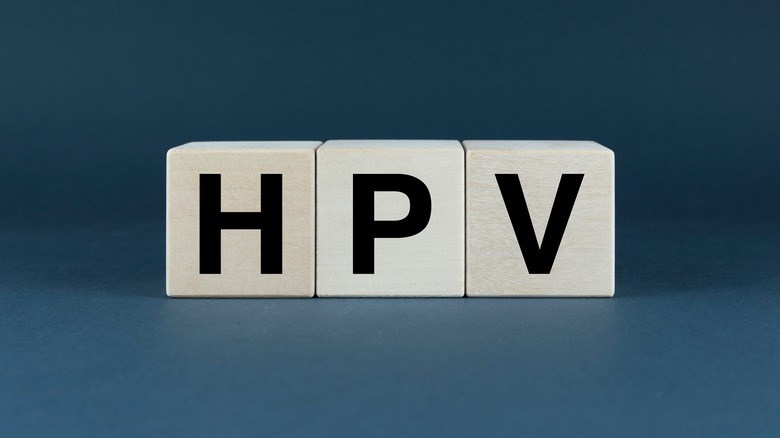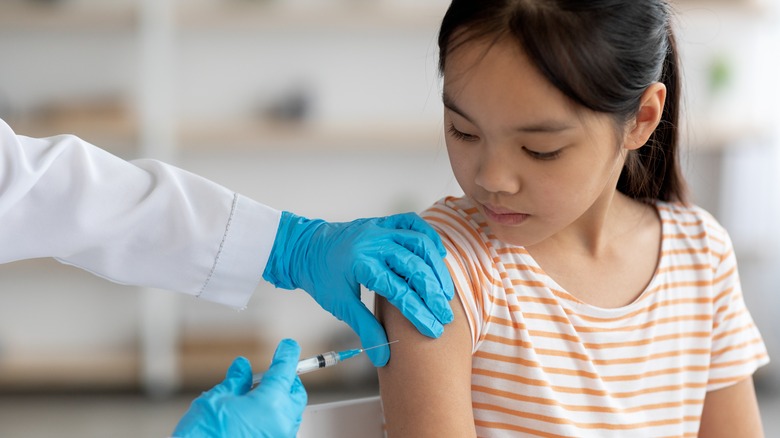Can Anal Sex Cause Colon Cancer?
Practicing safe sex and being informed about potential risks is always important, from sexually transmitted infections (STIs), injuries, and increased chances of developing more serious health conditions (via MedicalNewsToday). Being mindful of your sexual practices can make your experience in the bedroom more intentional and thoughtful for both you and your partner. When it comes to anal sex, undesirable effects include bacterial infections, worsening of hemorrhoids, and skin irritations. Luckily, most of these conditions can be easily treated or managed with the help of a healthcare professional. But what about more serious results of engaging in anal sex, like colon cancer?
Colorectal cancer, otherwise known as colon cancer, is one of the most common forms of cancer diagnosed in the United States, according to The University of Texas MD Anderson Cancer Center. This type of cancer can affect the rectum or the colon, thus emphasizing its name as colorectal cancer. Typically, colon cancer begins with polyps that are made up of cells that could begin to divide uncontrollably, which causes cancerous material to develop in the colorectal region. Early symptoms of colorectal cancer can be identified through changes in bowel movements, which can be noticeable in the shape, size, and consistency of stool, as well as sudden bouts of constipation or diarrhea. The presence of blood in the stool or from the rectal area can also indicate possible colon cancer. There are several known risk factors for colorectal cancer, but is having anal sex one of them?
Watch out for HPV
Colon cancer is often the result of first contracting human papillomavirus (HPV), per HealthMatch. Approximately nine out of 10 cases of colorectal and anal cancers can be attributed to one of the 200 strains of HPV, though it's paramount to note that many strains of HPV don't pose dangers or increase the risk of developing cancer. Research studies have found that out of 55 patients with colon cancer, 51% of people had HPV DNA, per a 2006 study published in Clinical Cancer Research. The Centers for Disease Control and Prevention (CDC) report that HPV strains are frequently transmitted through sexual intercourse, which encompasses oral, vaginal, and anal sex. Having sex with a partner who is HPV positive, even if they don't have any active symptoms, can put you at risk of acquiring HPV yourself and therefore posing an increased risk of developing cancer. It's wise for both you and any potential sexual partners to be tested for HPV before engaging in intercourse because signs and symptoms of HPV can be dormant for years before they appear.
In addition to HPV, other lifestyle and health factors can increase the likelihood of developing colon cancer, per The University of Texas MD Anderson Cancer Center. Most colon cancer diagnoses occur in patients between the ages of 65 and 74, when there is a medical history of polyps or inflammatory bowel disease (IBS) and if a person has a family history of colorectal or anal cancer.
Tips for safe anal sex
Since the risk of developing colon cancer from anal sex comes through the transmission of human papillomavirus, preventing the contagion of HPV is a priority for protecting both your health and the health of your sexual partner (via HealthMatch). There are vaccines to protect against several strains of HPV that are available for children of around nine to 11 years of age. If possible, receiving the vaccination series, called Gardasil 9, prior to becoming sexually active is the best way to maximize the prevention of HPV infection, though people who are currently sexually active or have been sexually active in the past are still eligible for the vaccine.
When engaging in anal sex, it's advisable to always wear a condom (per WebMD). Since the skin of the anal area and rectum is thinner than other parts of the genital area, be aware that tearing can occur and subsequently allow bacteria and HPV to enter the body through the bloodstream. Because of this risk, condoms and water-based lubrication are highly recommended. To prevent tearing, practicing relaxation techniques, like meditation, mindfulness, and taking a hot shower or warm bath before engaging in anal sex can subdue clenching, which can create increased potential for tearing. Utilizing an anal douche and washing the rectal area with soap and warm water before and after sexual activity can decrease the presence of bacteria and other contagions. Lastly, always communicate openly with your partner and cease activity if it becomes painful.



